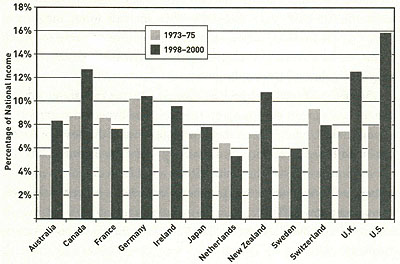Tim Noah is doing a long series of articles in Slate about the growth of income inequality in the United States, and the first part after the introduction is titled “The Usual Suspects Are Innocent.” Actually, that could stand in for parts two and three as well. Gender and racial gaps don’t explain it. Immigration doesn’t explain it. And the explanation most beloved of wonks and libertarians worldwide, skill-biased technological change, doesn’t explain it either. SBTC theory, roughly, says that over the past few decades the world has become more complex and therefore rewards education and smarts more than it used to. Thus, there’s relatively more income going to the highly skilled and relatively less going to the unskilled and semi-skilled. There are several reasons to think that SBTC doesn’t actually explain an awful lot, but the simplest is this concession from MIT economist David Autor:
Autor readily concedes that computer-driven job polarization can’t possibly explain the entire trend toward income inequality in the United States, because income inequality is much greater in the United States than it is in Europe.
 Hmmm. Yes. They have computers and electricity and cell phones in lots of countries, but not every country has seen vast increases in income inequality. The chart on the right is from Winner-Take-All Politics, by Jacob Hacker and Paul Pierson, and it shows the share of national income that goes to the top one-percent in various countries. In the United States it’s doubled since 1973. In France, Germany, and Japan it’s barely budged. But those other three countries are all as technologically advanced as we are. So what gives?
Hmmm. Yes. They have computers and electricity and cell phones in lots of countries, but not every country has seen vast increases in income inequality. The chart on the right is from Winner-Take-All Politics, by Jacob Hacker and Paul Pierson, and it shows the share of national income that goes to the top one-percent in various countries. In the United States it’s doubled since 1973. In France, Germany, and Japan it’s barely budged. But those other three countries are all as technologically advanced as we are. So what gives?
More about that later. Tomorrow morning, in fact. And of course, Tim Noah’s series will continue through next week, so we’ll see what he decides to finger as the main culprit. Stay tuned!















